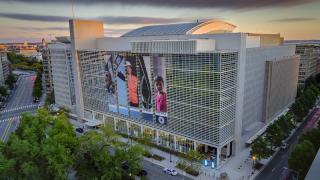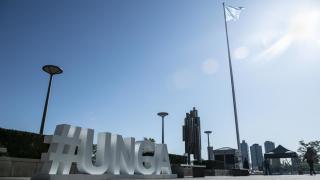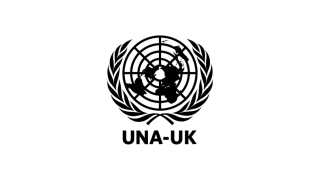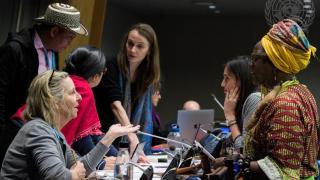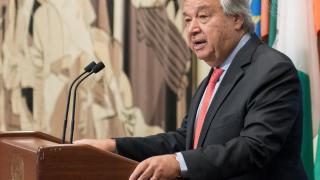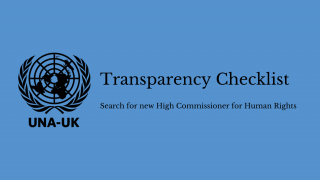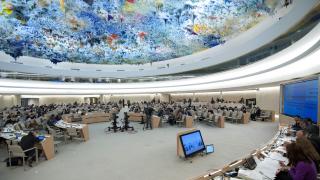
This article is part of our regular series of background briefings on the UN in the news.
This page is part of our campaign to find the best High Commissioner for Human Rights. Back to the campaign hub.
On 11 June 2018 the UN Secretary-General officially began the search for the next High Commissioner for Human Rights (HCHR) - the UN's top official for human rights and the head of the UN's rights office: the Office of the High Commissioner for Human Rights (OHCHR). UNA-UK is strictly neutral on the question of who should be appointed HCHR but is running a campaign for a meritocratic and transparent process.
In our latest UN briefing we look at the background to the appointment. Who is the High Commissioner? What do they do? How are they chosen?
Who is the High Commissioner?
The High Commissioner for Human Rights is the principal human rights official of the United Nations, tasked with spearheading the work of the UN in that area. Human rights is one of the three "pillars" of the work of the UN, alongside peace and security and development, although it receives far less funding and - some would say - attention than the other two.
The post of High Commissioner was created as a result of the 1993 World Conference on Human Rights, which called for the UN's human rights machinery to be strengthened. The first High Commissioner was appointed in 1994, which also saw the establishment of the Office of the High Commissioner for Human Rights (OHCHR).
Today, the office has around 900 staff. It is allocated around 3.7% of the UN’s core budget - some $200 million for the biennium 2018-19 - in addition to voluntary funding (in 2017, $143 million was received). Much of the Office’s impact, therefore, comes from the HCHR’s role as a strong advocate and effective diplomat for the protection of human rights and human rights defenders.
The current High Commissioner is Zeid Ra'ad Al Hussein.
What does the High Commissioner do?
OHCHR's work has three major dimensions: standard-setting, monitoring, and implementation on the ground. They offer expertise, and substantive and secretariat support to the different United Nations human rights bodies as they discharge their standard-setting and monitoring duties. These can include investigative mechanisms and commissions of inquiry.
In addition the High Commissioner uses their profile, media presence and ability to brief states and UN organs to name and shame or name and praise states and others who support or violate human rights. Their work on the ground is achieved through 14 country offices, human rights staff embedded in 15 high level political or peacekeeping missions, 12 regional offices, human rights advisors embedded within the UN country teams in 28 other countries, and a rapid response unit for emerging crises.
The HCHR's top-level duties were established by the 1993 General Assembly Resolution that created the mandate, updated by various subsequent resolutions and paraphrased in the 2018 job advertisement. As well as working on human rights issues directly, OHCHR provides support to other UN mechanisms, such as the bodies that govern human rights treaties, and independent human rights experts. These processes have their own mandates and governance, but rely on the office for secretarial support.
OHCHR also provides the secretariat for the UN Human Rights Council, a body of 47 states elected by the UN General Assembly to take responsibility for human rights issues. The High Commissioner provides these states with information, and states will frequently task the office with implementation of its resolutions. For example, OHCHR can be asked to set up commissions of inquiry or to report on specific issues and countries of concern.
Sometimes described as the UN 'focal point' for human rights, the role of the High Commissioner with respect to the wider UN system is not always clear. The High Commissioner and other OHCHR representatives have regularly been invited to brief the Security Council. 52 formal and informal meetings took place between 2010 and 2015, on issues such as Burundi, Syria and Ukraine (although the High Commissioner was recently blocked from briefing the Council on Syria).
OHCHR has a New York office, headed by a senior official, that works to ensure that human rights are integrated in the UN's humanitarian, peace and security and development work. It also supports the Human Rights up Front initiative - created by former Secretary-General Ban Ki-moon in response to failures to protect civilians in Sri Lanka - to place human rights at the heart of the UN's work. The High Commissioner sits on the UN Development Group, although they do not sit on its core group, or its important advisory group. There are Peace and Development Advisors (PDAs) who provide a vital link between the UN's human rights and development work in some countries.
Who selects the High Commissioner?
The High Commissioner is a senior member of the UN Secretariat staff - ranked at Under-Secretary-General level. As such, the Secretary-General's office is in charge of the recruitment process which results in the appointment of a candidate who must be approved by the UN General Assembly. The current High Commissioner finishes his term on 1 September 2018. His replacement must be chosen by then, or an interim High Commissioner will need to be named. The Secretary-General's job advert has a closing date of 11 July for applications.
The resolution authorising the mandate says that there must be "due regard to geographical rotation". This doesn't mean that the post must strictly rotate between the UN regions, but means that they cannot always come from the same region. Former High Commissioners have been fairly evenly spread between the regions. There is no gender criteria in the resolution, although it is known that the Secretary-General has been attempting to ensure that there are more women in senior positions at the UN. Indeed, his call for nominations includes strong encouragement for women to be nominated.
The High Commissioner is appointed for "a fixed term of four years with a possibility of one renewal for another fixed term of four years", although no High Commissioner has ever lasted a full eight years. UNA-UK's general position is that senior UN staff should serve single terms to reduce the political pressures of reappointment. However, seeking to change formally the High Commissioner's term could result states seeking revisions to the post's mandate - a potentially dangerous step at a time when human rights are under attack across the world. But candidates could commit voluntarilty to serving a single term.
There are no other formal requirements with regards to transparency or meritocracy of the process, but following the successful "1 for 7 Billion" campaign for a more effective and transparent process for selecting the Secretary-General (which UNA-UK co-founded) there is increased pressure to improve the process. The UN's independent external oversight body, the "Joint Inspection Unit" wrote a report on best practice to be followed for senior appointments in 2011.
How could the process be improved?
Watch this space for details of our campaign on this question. Our letter to the Secretary-General called for a transparent, inclusive, meritocratic process which engages with civil society and the public. Specific proposals included: publishing a formal set of selection criteria; improving the global visibility of the formal call for candidatures; publishing a clear timetable for the selection process that enables adequate assessment of candidates; and requiring candidates to produce vision statements. The Secretary-General's response demonstrated a clear commitment to civil society nominations, external experts and the commitment to gender diversity. However, the timeframe is very tight for a robust process.
Who is in the running?
Candidate names are not made public as the UN feels doing so would comprimise the confidentiality of the recruitment process. However, there is already media speculation about candidates, which we have compiled here.
Please note: we are not in a position to verify the accuracy of these reports nor do we take any position on any candidate.
What sort of skills are required?
The Secretary-General has published selection criteria focused on the personal qualities he believes necessary for the position. They are as follows:
- Demonstrated extensive knowledge of human rights issues and challenges derived from experience of leadership in an academic, governmental, intergovernmental and/or non-governmental setting;
- Ability to be a powerful and convincing advocate on all aspects of human rights worldwide within the United Nations system, including charter- and treaty-based human rights bodies, and with Governments, national institutions and civil society organizations, as well as the wider public;
- Demonstrated leadership experience with strategic vision and proven skills in leading transformation in, and managing complex organizations, such as intergovernmental, international non-governmental or multinational private sector entities;
- Proven track record of change management in complex organizations and accomplishments at the regional, national or international level with strong resource mobilization, political and diplomatic skills;
- Demonstrated ability to work harmoniously in a multi-cultural team and establish harmonious and effective working relationships both within and outside the organization;
- Proven ability to inspire, encourage, build trust and confidence and also build consensus, stimulate effective campaigns and drive collective action among a broad spectrum of people and organizations;
- High commitment to the values and guiding principles of the United Nations and familiarity with the United Nations system, including peacekeeping, human rights, humanitarian and development settings and challenges.
There are varying views from member states, civil society and the public on what characteristics will be most valuable. We will be putting this question to a number of experts and practitioners in the coming weeks.
Traditionally, High Commissioners have favoured emphasising one of the following roles: skilled diplomats, who are effective at working with member states to effect reforms, or passionate campaigners, who can be an effective voice for victims and can hold perpetrators to account. UNA-UK has previously argued that at this moment - when there is strong pushback against human rights at the UN, but also a highly experienced diplomat and mediator in the position of Secretary-General - a high-profile, vocal High Commissioner is needed to serve as the world's human rights advocate.
Given the extraordinary high pressures OHCHR is under, including budget constraints, there may also be significant pressures to appoint a third kind of High Commissioner: an effective manager and administrator for OHCHR.
How can I get involved?
UNA-UK are launching a campaign to ensure that we find the best possible High Commissioner for Human Rights. Can you chip in to get the campaign off the ground? Know a world leading human rights defender? If so forward the job advertisement to them, or share it on social media.

